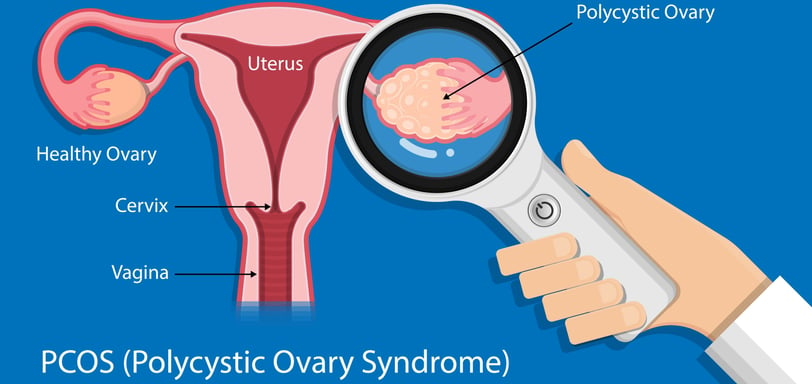AADHYATVA PRODUCTS COMING SOON
Unveiling PCOS Through Ayurveda: Understanding the Root Causes and Holistic Management
DR BHAVANA MENKUDALE
12/30/20242 min read


Polycystic Ovary Syndrome (PCOS) is a complex hormonal disorder affecting millions of women worldwide. While modern medicine identifies low-grade inflammation and lifestyle disorders as key contributors, the exact causative factors remain elusive. Ayurveda, the ancient Indian system of medicine, offers a unique lens to understand the pathogenesis of PCOS, delving deeper into its root causes and providing holistic management strategies.
PCOS and Its Modern Understanding
PCOS manifests as irregular menstrual cycles, ovarian cysts, excessive androgen levels, and often, infertility. Recent research highlights chronic low-grade inflammation as a significant driver of ovarian dysfunction and increased androgen production. However, inflammation itself is a symptom rather than a root cause, leaving many questions unanswered.
Lifestyle factors such as poor diet, stress, and sedentary habits undeniably exacerbate PCOS. Yet, these triggers don’t provide a comprehensive explanation of why some women develop PCOS while others don’t. This is where Ayurveda bridges the gap.
Ayurveda’s Perspective on PCOS
In Ayurveda, PCOS aligns with an imbalance in the three doshas—Vata, Pitta, and Kapha. Each dosha plays a vital role in maintaining the body’s harmony, and any disruption can lead to disorders:
1. Kapha Dominance: PCOS is often associated with Kapha imbalance, leading to the accumulation of toxins (Ama) in the reproductive system. This stagnation affects the natural flow of hormones and energy, resulting in cyst formation.
2. Vata Imbalance: Vata governs movement and regulation. When disturbed, it can hinder the proper maturation and release of eggs, causing irregular ovulation.
3. Pitta Aggravation: Pitta imbalance may fuel inflammation, exacerbating hormonal disruptions and symptoms like acne or excessive hair growth.
Root Cause Analysis: Ayurvedic Insights
According to Ayurveda, PCOS stems from improper digestion (Agni dysfunction) and toxin buildup, aggravated by poor lifestyle choices. Factors like stress, excessive consumption of processed foods, and lack of physical activity disrupt metabolic pathways, creating an environment for PCOS to develop.
Understanding these nuances allows Ayurveda to not only identify but address the root cause of PCOS through personalized care.
Holistic Management of PCOS in Ayurveda
Ayurveda emphasizes a combination of lifestyle modifications, dietary adjustments, herbal remedies, and stress management:
1. Dietary Adjustments: A Kapha-pacifying diet rich in whole grains, fresh vegetables, and lean proteins is recommended. Avoiding processed foods, refined sugars, and dairy helps maintain hormonal balance.
2. Herbal Remedies:
Ashwagandha: Known for its adaptogenic properties, it helps manage stress and cortisol levels.
Shatavari: Supports reproductive health and hormonal balance.
Turmeric (Curcumin): Its anti-inflammatory properties help reduce systemic inflammation.
3. Lifestyle Modifications: Regular physical activity, yoga, and pranayama (breathing exercises) enhance circulation, reduce stress, and support ovulation.
4. Detoxification: Panchakarma, an Ayurvedic detox therapy, aids in removing Ama and resetting metabolic functions.
5. Mental Wellness: Stress is a significant trigger for PCOS. Ayurvedic practices like meditation and mindfulness address mental health, creating harmony between mind and body.
Integrating Ayurveda with Modern Science
While modern medicine excels in diagnosing and managing symptoms through medications like oral contraceptives or insulin-sensitizers, Ayurveda complements these approaches by addressing the underlying imbalances. Together, they provide a more comprehensive solution for managing PCOS effectively.
Final Thoughts
PCOS is not merely a hormonal disorder; it is a reflection of our lifestyle and choices. Ayurveda teaches us to listen to our bodies, understand the root causes, and restore balance through natural, sustainable practices. By incorporating Ayurvedic principles, women with PCOS can achieve holistic well-being and long-term health.
If you're looking for personalized guidance on managing PCOS, consult an Ayurvedic practitioner who can tailor treatments to your unique constitution
